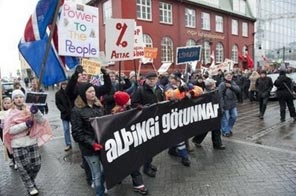Icelanders refuse to foot bill for bank collapse
REYKJAVIK: Iceland's socialist government was surveying the damage Sunday after a referendum rejected a deal to pay Britain and the Netherlands billions for losses in the collapse of the Icesave bank.
As expected, Icelanders overwhelmingly voted down the deal in Saturday's referendum, with some 93.6 percent of voters lined up on the "no" side after more than 50 percent of the votes had been counted.
Only 1.5 percent of voters had so far voted "yes" to the Icesave deal, said RUV public broadcaster which compiles all electoral statistics.
It remained unclear how many of Iceland's 230,000 eligible voters had cast their ballots Saturday, but an hour before polls closed the turnout rate stood at 54.45 percent, said RUV.
"This is nothing that comes as a surprise," Prime Minister Johanna Sigurdardottir told public broadcaster RUV late Saturday.
"After this referendum it is our job to start finishing the negotiations," added Sigurdardottir, who on Friday had described the plebiscite as "meaningless" and said she would not vote.
But President Olafur Ragnar Grimsson, whose refusal to sign the bill after it was voted through parliament in December led directly to the referendum, said it had been important to hold it. Events leading to Iceland bank payout referendum
"I think the outcome of this referendum can be seen as a strong expression of the public will," he told AFP before Saturday's result.
Icelanders were asked to vote on whether the country should honour an agreement to repay Britain and the Netherlands 3.9 billion euros (5.3 billion dollars) by 2024.
This would be to compensate them for money they paid to 340,000 of their citizens hit by the collapse of Icesave in 2008.
Some observers had warned that a "no" vote might result in the International Monetary Fund blocking the remaining half of a 2.1-billion dollar rescue package.
It could also hit European Union and euro currency membership talks, Iceland's credit rating and destabilise the leftwing government, which negotiated the agreement in the first place, they argued.
Grimsson however insisted the referendum had already "had a very positive effect. It has moved the British and the Dutch towards a fairer deal." Interview: Grimsson says Icesave vote a boost for democracy
London and The Hague did make Iceland a better offer than what was being voted on Saturday: but the government here, under pressure from the opposition, turned it down.
Grimsson said that while Icelanders were not against compensating Britain and the Netherlands, many considered that the repayment conditions, and especially the high 5.5-percent interest rate agreed upon, were exorbitant.
"The people of Iceland, farmers, fishermen, teachers, nurses, are by and large willing to repay to Britain and the Netherlands what is equal to over 20,000 euros per depositor," Grimsson said.
"But they are not ready to pay a very high interest rate so that the British and Dutch governments would make a huge profit off this whole exercise."
The Dutch finance ministry issued a statement late Saturday making it clear that the result was an internal matter for Iceland.
But the statement also said that the Dutch and British finance ministers, Jan Kees de Jager and Alistair Darling had written jointly to their Icelandic counterpart Steingrimur Sigfusson to say they were ready to resume talks.
Contacted by AFP, a spokesman for the International Monetary Fund declined to comment.
Magnus Arni Skulason, a founder of the Indefence movement opposed to the deal, welcomed Saturday's result.
"It's too good to be true," said Skulason.
Earlier he had told AFP that the 5.5-percent interest rate that had formed part of the agreement was particularly unacceptable.
It had been obtained "through coercion, with threats from both the British and the Dutch against Iceland," he argued.
"You're basically sending the bill to tax payers for the failure of a private bank," he said.
Hundreds of people demonstrated in front of parliament on Saturday, demanding the government do more to improve conditions in Iceland. Scene: Icelanders express frustration and fury as they vote
Banging on pots and pans, the protesters brandished banners exclaiming "Icesave, no, no, no!" and calling for an end to the Icelandic government's "financial casino".
Since Iceland's once thriving economy crumbled in October 2008, unemployment and home repossessions have increased.






